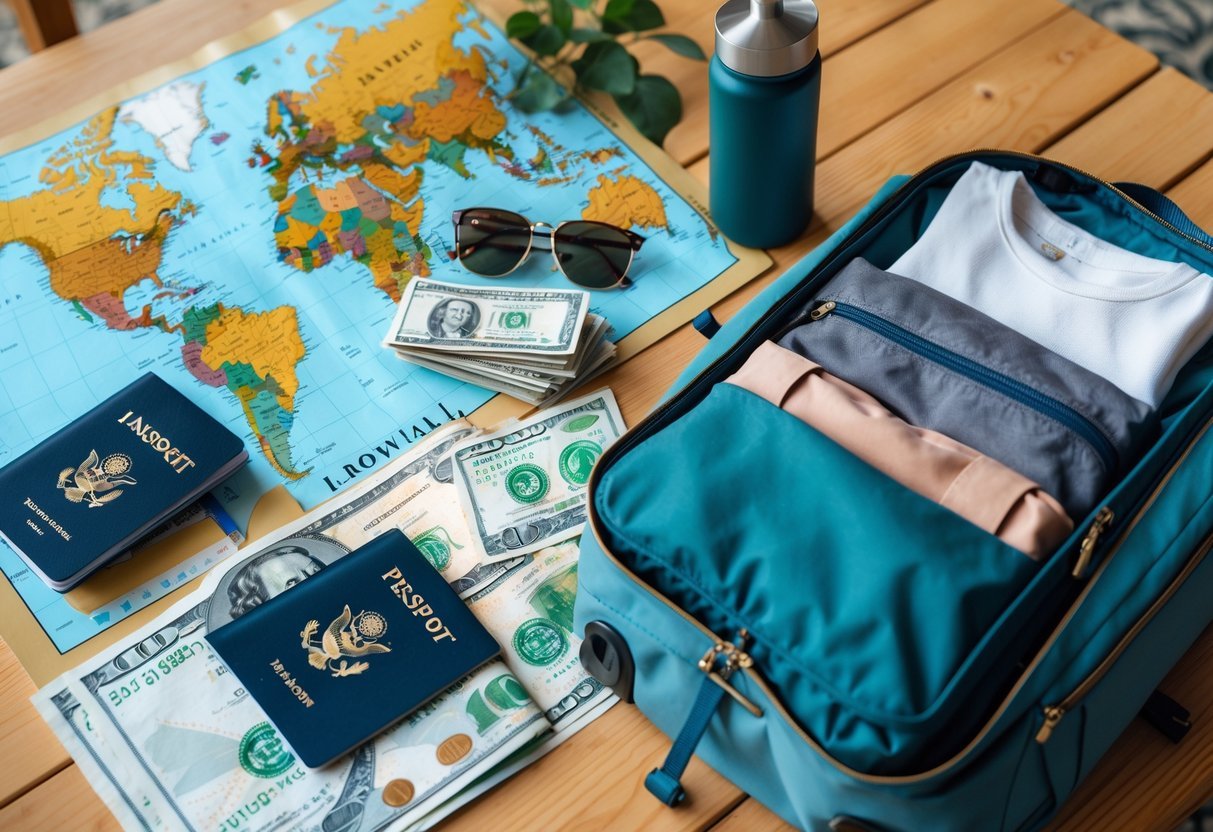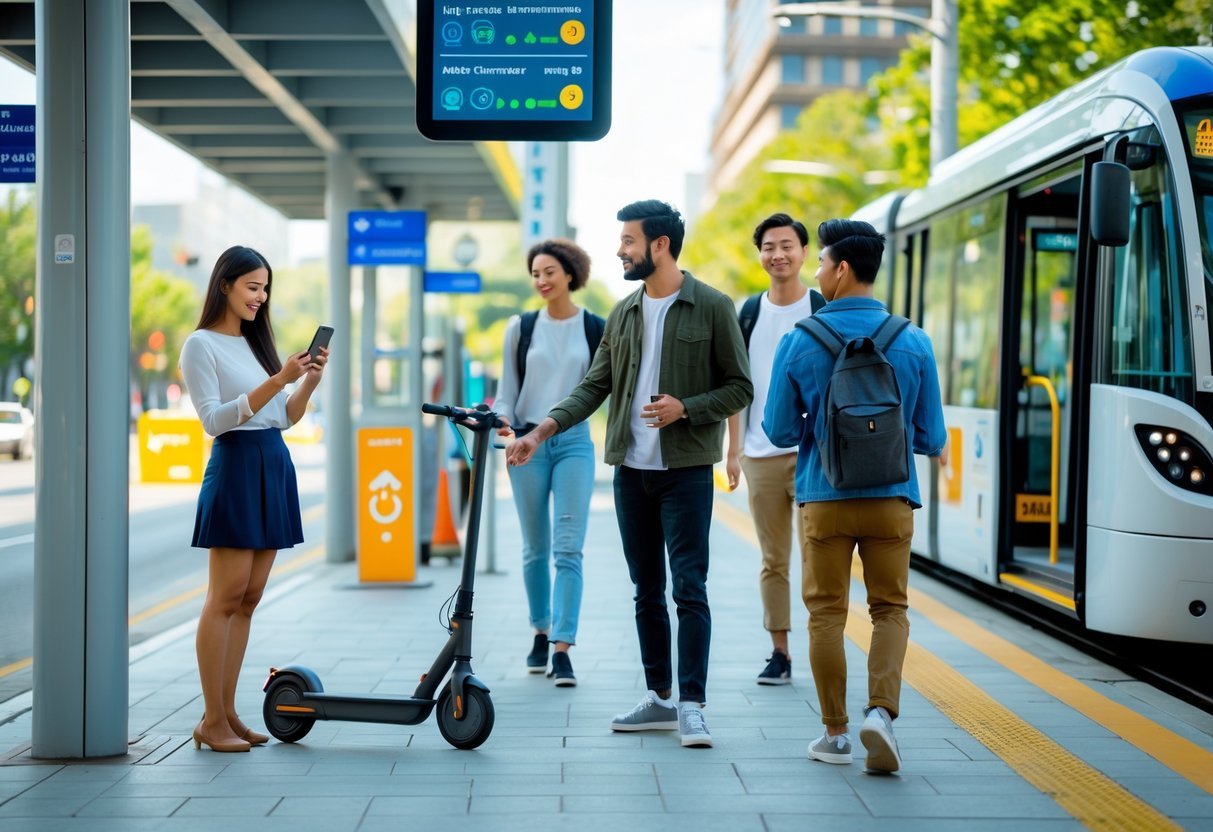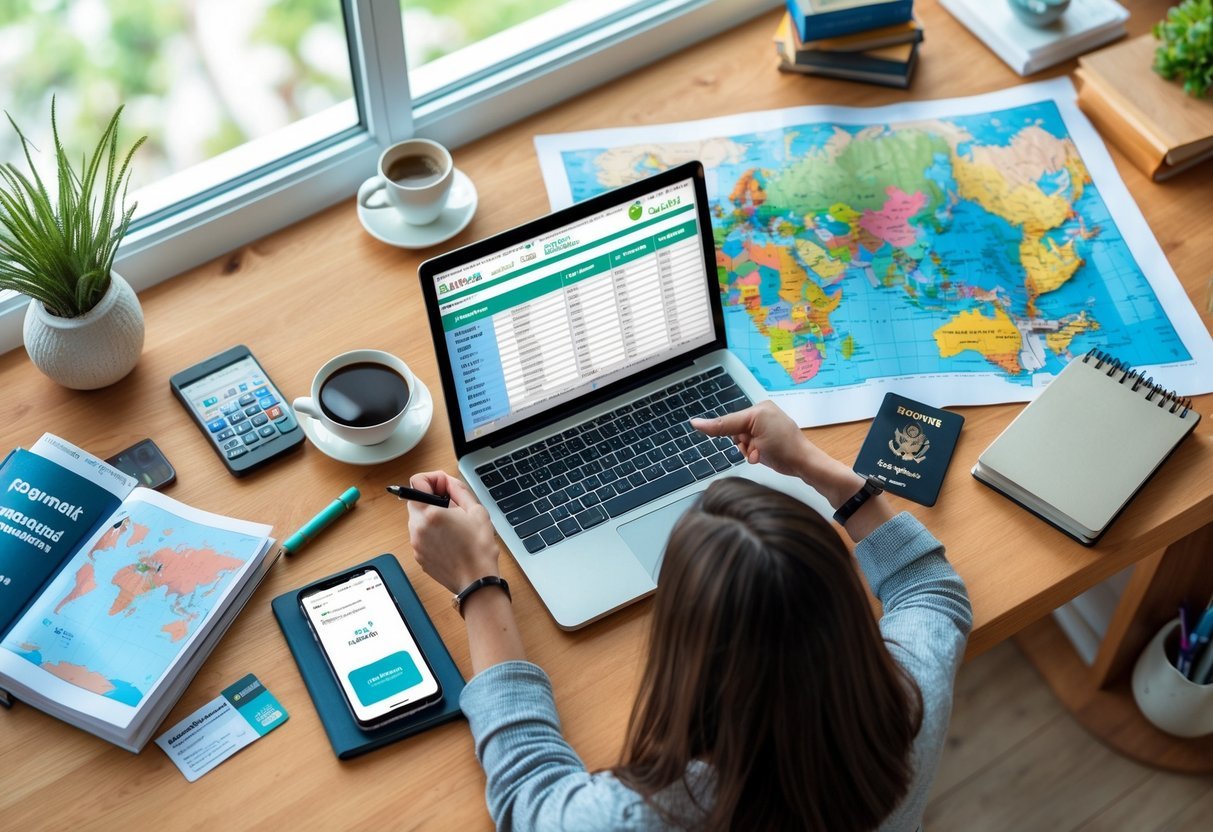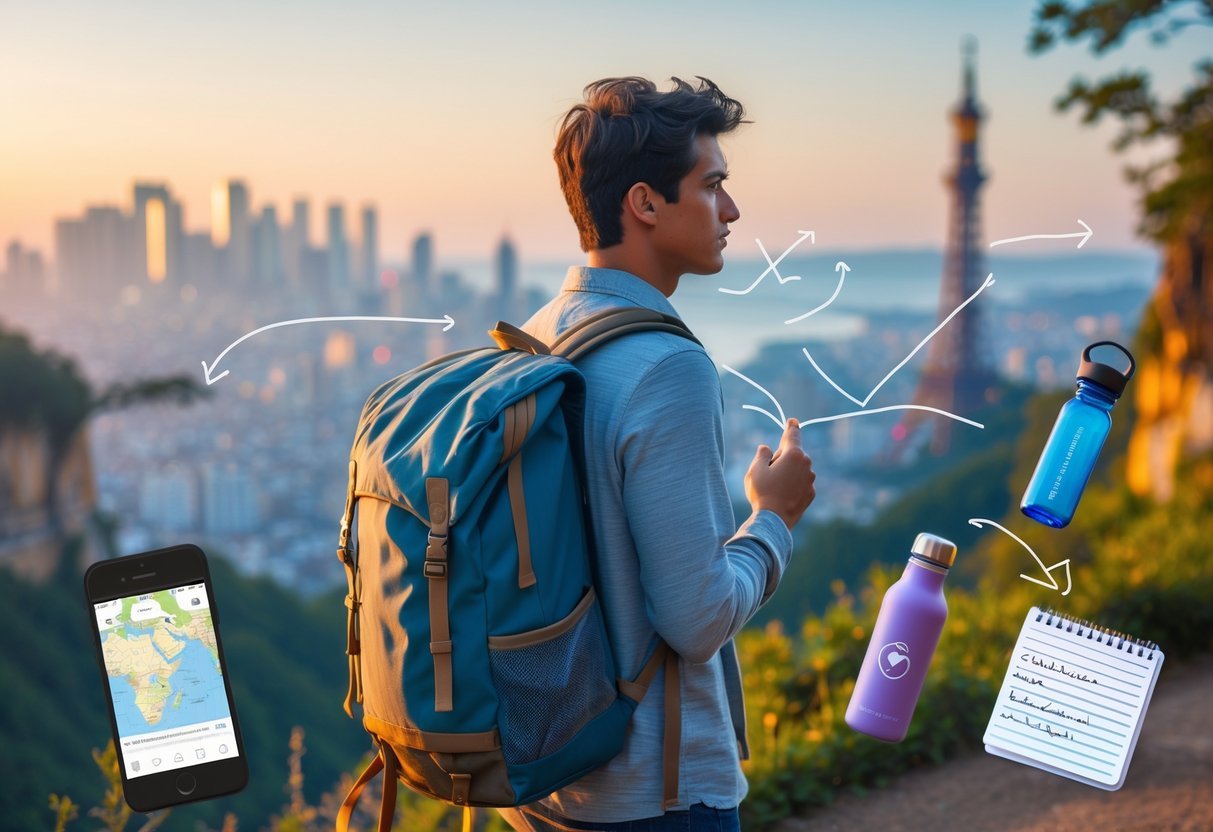Travel costs sneak up on you fast, but you honestly don’t have to blow your savings to have a great trip. With a few clever travel hacks, you can trim expenses on flights, hotels, food, and getting around—without cutting out the good stuff.
These tips are about squeezing the most value from your budget, not missing out.

You’ll find out how to score cheaper flights, book smarter, and dodge those sneaky fees that add up. Even little tweaks to how you plan can make your travels way more affordable.
Maximizing Flight Savings

Flights are usually the biggest expense, but you can outsmart the system with the right tools. Searching flexibly, watching for deals, and using efficient platforms really pays off.
Flexible Date and Destination Searches
If you’re open with your travel dates and destinations, you’ll almost always get a better deal. Flying midweek or at odd hours can drop prices a lot—so avoid weekends if you can swing it.
Use search engines that show prices for an entire month or a few weeks at a glance. That way, you can spot the cheapest days without endless clicking.
Trying nearby airports or even alternate cities can sometimes save you a surprising amount. Flexibility is honestly one of the easiest ways to keep your travel budget in check.
Set Up Flight Alerts
Flight alerts are a lifesaver. Apps like Skyscanner and Kayak will ping you when prices drop on your chosen routes.
You can set alerts for exact dates, destinations, or just a price range. No need to obsessively refresh flight pages—just let the deals come to you.
Set up a few alerts for different options. It ups your odds of catching a real bargain.
Book with Google Flights
Google Flights is a go-to for comparing prices and staying on top of fare changes. The calendar view shows cheap days instantly, which is honestly so much easier than most other sites.
You can filter for airlines, times, or connections, and it’ll even suggest cheaper airports if you’re flexible.
The price tracking tool is handy—it’ll send you notifications if fares drop or jump. Catch a deal fast and you won’t have to pay more later.
Finding Affordable Accommodations

Lodging eats up a lot of cash, but you don’t have to settle for sketchy places. There are plenty of ways to get a comfy spot for less if you know where—and how—to look.
Hostels and Shared Lodging
Hostels are a classic budget move, especially if you’re cool with sharing. Dorm rooms are way cheaper than privates, and a lot of hostels throw in free or cheap activities.
Check for solid reviews and must-have perks like lockers, Wi-Fi, and a kitchen. Cooking your own meals is a huge money-saver.
Some hostels run group tours or social events, so you get more for your money and meet people along the way.
Using Booking.com for Deals
Booking.com is a lifesaver for comparing hotel prices. You can filter by price, reviews, and location—plus set alerts for price drops on places you like.
“Free cancellation” is a great filter to use. Book early, change plans later, and you won’t lose cash if something comes up.
Watch out for those sneaky taxes or resort fees in the fine print. Sometimes there are “secret deals” if you sign up for an account, so it’s worth a shot.
Airbnb Strategies
Airbnb lets you find unique stays and sometimes better deals, especially for longer trips. Look for weekly or monthly discounts—they can be pretty generous.
Message hosts before booking if you’re staying a while; a little negotiation can go a long way. Always read reviews (seriously, don’t skip this step) and double-check amenities.
Having a kitchen is a game changer for your food budget. Use filters to pick places that fit your needs—private, shared, whatever works for you.
Smarter Local Transportation

Getting around can chew up your spending if you’re not careful. Public transit, smart ticket choices, and knowing when to use rideshares can keep you moving without draining your wallet.
Leveraging Public Transport
Trains, buses, and trams are almost always the cheapest way to get around a city. Before you go, check routes and schedules online or with apps—waiting around or grabbing a pricey taxi is no fun.
Traveling during off-peak hours is often cheaper and way less crowded. Buying tickets in advance or using contactless payments can dodge extra fees.
If you’re lost, ask locals or peek at online forums for tips. Night buses or shuttles can be solid alternatives to taxis, especially after hours.
Benefits of Multi-Day Passes
If you’ll be using transit a lot, grab a multi-day or unlimited ride pass. They’re almost always cheaper per ride than singles.
These passes save time at ticket booths and mean you don’t have to fumble for change. Tourist cards sometimes bundle transit and discounts for attractions, which can be a sweet bonus.
Using Uber Abroad
Uber and similar apps are handy, but they’re not always the cheapest. Use them if public transit isn’t running, it’s late, or you’ve got too much luggage to lug around.
Compare Uber prices to local taxi apps or transit fares. Some cities have their own rideshare apps that are cheaper—worth checking before you book.
Uber Pool or shared rides can cut costs if you’re okay with a bit less privacy. Splitting a ride with others heading the same way is an easy win.
Managing Travel Finances

Money stuff gets tricky on the road. Watching out for hidden fees, snagging the best exchange rates, and having the right insurance can save you headaches and cash.
Avoiding Foreign Transaction Fees
Foreign transaction fees are sneaky. Every time you swipe abroad, your bank might tack on 1-3% per purchase.
Use cards that don’t charge these fees. Plenty of travel credit cards offer this perk—and rewards, too. Let your bank know you’re traveling so they don’t freeze your card unexpectedly.
Carry a bit of local cash for small things. Sometimes it’s just easier, and you’ll avoid those little card fees piling up.
Optimizing Currency Exchange
Exchange rates can be all over the place. Airports and hotels usually give you the worst deal, with extra fees tacked on.
Check rates online before you go. ATMs with no international fees are often cheaper, but make sure the machine looks legit.
Don’t exchange money on the street. It’s not worth the risk of getting scammed. Always count your cash before you walk away.
Travel Insurance Essentials
Travel insurance isn’t glamorous, but it’s a must. Medical emergencies, cancellations, lost bags—it all adds up if you’re not covered.
Pick a policy that actually fits your trip. Medical coverage is key, especially if you’re going abroad. Emergency evacuation and lost belongings are good to have, too.
Read the fine print. Know how to file a claim and keep your receipts. Buying insurance right after booking can sometimes get you better cancellation coverage.
Free and Low-Cost Experiences

You don’t have to drop a ton of money to have a great time. There are loads of free or cheap things to do if you know where to look and plan ahead.
Discovering Free Walking Tours
Free walking tours are a fun way to get to know a city. Just show up at the meeting spot—usually a central square or landmark—and you’re set.
You pay what you want at the end, so it fits any budget. It’s a solid way to get local insights without the price tag of a private guide.
Check reviews before you go so you don’t end up on a dud tour. Most last a couple hours and hit the main sights, which is a nice intro to any new place.
Accessing Free WiFi
Staying connected abroad can get expensive if you’re using mobile data. Cafes, libraries, hotels, and even parks often have free WiFi.
Some cities offer public WiFi in busy areas. Apps and websites can help you track down reliable hotspots nearby.
Always use a VPN on public WiFi to keep your info safe. It’s a simple trick to avoid data charges and stay online for free.
Advanced Money-Saving Strategies

Want to stretch your dollars even further? Little things like where you eat, when you book, and timing your trip can make a big difference—without making your experience any less awesome.
Eating Like a Local
Skip the tourist restaurants and eat where locals do. Markets, food stalls, and tiny family spots usually have the best food for less.
Hotel restaurants are almost always overpriced. If you’ve got a kitchen, grab groceries and whip up a meal or two.
Trying local dishes is usually cheaper and way tastier than sticking to big chains. Ask locals or use apps for recommendations—you’ll almost always eat better for less.
Timing Your Bookings
Booking flights and hotels at the right time can save you a lot. Aim to book flights about 6-8 weeks in advance for the best deals.
Prices tend to climb in those last few weeks before departure, so waiting too long can backfire.
Try using price tracking tools to keep an eye on flight costs. Those alerts when prices drop? Surprisingly handy.
When it comes to hotels, booking early or going for a last-minute deal can both work out. Honestly, it depends a bit on your destination and how flexible you feel.
Avoid locking things in on weekends or holidays—prices usually spike then. Mid-week bookings often sneak in with better rates, though it’s not a guarantee.
Traveling During Shoulder Season
The shoulder season falls between the busiest and slowest times for travel. It’s honestly one of those underrated windows where your wallet gets a break—flights, hotels, even tours usually cost less.
You won’t be fighting crowds during shoulder season, but the weather’s still pretty decent in most places. Accommodations can drop by 20-40% compared to the heights of peak season, which is nothing to sneeze at.
Attractions tend to be less packed, so you get a bit more breathing room. Sometimes, you’ll even find discounted entry fees, though that’s not always guaranteed.





[…] management is key. If you’re planning to hit a bunch of paid attractions, a London Pass might save you money, though it’s not always a slam […]
[…] experiences and budget-friendly tips help you soak up NYC while keeping costs down. It’s honestly surprising how much you can do here […]
[…] post is all about practical, low-cost planning tips and everyday hacks that help you stretch your budget and still have a great trip in […]